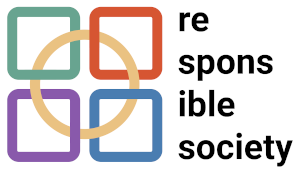

Promoting ACTIVE and Responsible Citizenship In Schools Project (ACTIVE)
Programme Erasmus+ Cooperation partnerships in School Education (Call 2021: KA220-SCH)
The European Commission’s support for the production of this publication does not constitute an endorsement of the contents, which reflect the views only of the authors, and the Commission cannot be held responsible for any use which may be made of the information contained therein.
The ACTIVE project is implemented together with five other partners from the Czech Republic (Josef Ressel Gymnasium in Chrudim), Slovakia (Felix Private Primary School), Poland (WSB University), Austria (ECECE) and Italy (Learnable). The Responsible Society is the expert guarantor of the development of the Methodology and Activities for Schools (Toolkit) within the project.
The project is implemented within the framework of the Erasmus+ Partnership for Cooperation in School Education. Further information can also be found on the Active-Citizen.eu project website.
Project description
In the time of so cooled “post-true” or “post factual” society described in the Oxford Dictionaries as “relating to or denoting circumstances in which objective facts are less influential in shaping public opinion than appeals to emotion and personal belief” the need for critical thinking, understanding of the context and possible impacts of ones actions and openness to support mutual discussion is crucial for active and responsible citizenship. All these is multiplied and closely connected with rise in usage of internet and social media as these are becoming the primary influential factor in the “consumption” of information and opinion making. In this context only active and responsible citizens that are open to communicate despite possible differences in values and needs and are able to reflect up on (possible) impacts of their decisions and actions can ensure sustainably of the democratic values and democratic society.
The ACTIVE project is precisely addressing this phenomenon aiming at empowering pupils (aged 12 to 15) and teachers to defend active and responsible citizens and democracy in the context of school to start with, as role models and multipliers. In order to be able to transform schools into promoters of ‘open, creative and responsible citizenship’, pupils and teachers will have to transform themselves first. Together with each other and experts, both groups will look at their own attitude, knowledge, language and behavior and create a sense of self-reflection and a school atmosphere where debate, open dialogue, and critical thinking are welcomed. Teachers shall be empowered to protect pupils, to create opportunities and to share responsibility for them. This also means society as a whole, politics, administration, civil society and experts has to be more involved with school life and ready to support teachers and pupils.
The main objective of the project is to empower pupils to navigate and make understanding of the world they live in to enable them act as active and responsible agents in democratic society.
This main objective will be met by focusing on the following operative and concrete objectives:
- Pupils will learn trough their own experience (based on developed methodology) how to deal with complex issues and information to make sense and understanding of the situation.
- As for young generations internet and social media especially are playing the key role in obtaining information, pupils will learn how to approach the information on the internet.
- Pupils will learn to understand their motivation and motivation of the others to be able to reflect upon their norms, biases, expectation and desired outcomes. Pupils will learn how to respond to the situation accordingly to their values and (possible) impacts of their action.
- Pupils will be learn to actively engage with open approach ready to consider also the (different) views of others.
- Teachers will acquire the knowledge and competences to promote and propagate the active and responsible citizenship in their regular classes to pass these competences to pupils.
To achieve the project objectives two major results will be produced:
- Toolkit for promoting ACTIVE and responsible citizenship at schools
- Guidelines for ACTIVE and responsible citizenship in schools
The production of Toolkit and Guidelines will be supported by following activities:
- Research related to the concerned topic
- Development of the methodology for the Toolkit (1-8/2022)
- Development of on-line platform for teachers and pupils to support learning and understanding the methodology of the Toolkit (4-8/2022)
- Blended training for teachers will be organized to ensure readiness of the teachers to implement the Toolkit in the classroom (8/2022)
- Continuous training and support for teachers from experts during the implementation phase is planed (9-2022 / 06-2023)
- Thorough and deliberate evaluation and feedback from teachers ensured by continuous communication between teachers and experts (9-2022 / 06-2023)
- Formulating Guidelines based on the lessons learned (07–12/ 2023)
- Dissemination and Communicati
Results:
The project has developed seven modules under the guidance of Responsible Society experts, covering key topics relevant to understanding and learning to work with information (critical thinking). The modules provide teachers with a comprehensive and structured description of the relevant aspects related to the topic.
The theoretical modules are accompanied by practical activities designed to be used by teachers directly in the classroom with students.
Project results are available on the project website ACTIVE Toolkit.
